Until 1938 the USA did not have a minimum wage and hour law.
But in order to alleviate what was referred to as “a third of the nation ill clothed, ill housed, and ill fed” Congress decreed the minimum wage to be 25 cents an hour, forty four hours a week.
Like all our laws, it was riddled with exceptions, providing employment to lawyers and lobbyists.
Here is a lawyer’s letter to North Carolina Congressman Graham A. Barden from 1939 concerning the exemption of tobacco bag stringers.
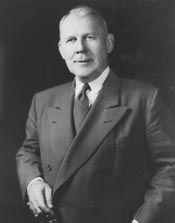
 en.m.wikipedia.org
en.m.wikipedia.org
Xxxxx
"A study of southern farm-operating white families not receiving relief or other assistance shows that those whose income averaged $390.00 spent annually only $49.00 on the food they bought, $31.00 on clothing, $12.00 on medical care, $1.00 on recreation, $1.00 on reading, $2.00 on education. * * * *
Xxxxx
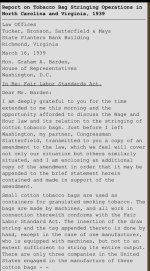
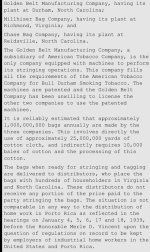
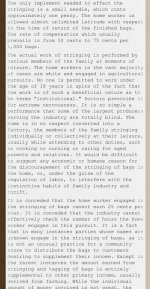
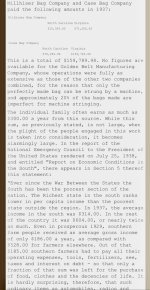
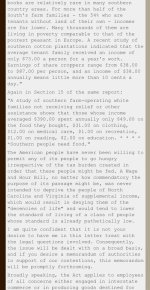
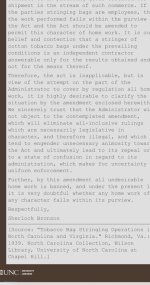
When I read things like this, I’m reminded of a verse from my youthful studies:
Behold, the wages of the laborers who mowed your fields, which you kept back by fraud, are crying out against you, and the cries of the harvesters have reached the ears of the Lord of hosts.
James 5:4
There is no easy answer to problems like tobacco bag stringing was.
The annual market was for one billion cotton tobacco bags, for tobacco worth fifty million dollars retail at a nickel a bag.
A billion is a thousand million. At one cent a bag there were ten million dollars a year worth of cotton bags manufactured.
The 600 pound gorilla of the market was the subsidiary of the American Tobacco Company that used patented stringing machines for Bull Durham. Their operators had to be paid $11 a week.
The other two bag stringing operations had to provide cotton bags for tobacco that retailed for five cents a bag in the stores. The two smaller operations only paid $160,000 to the bag stringers, and would have only had about one per cent of the cotton tobacco bag market.
They paid a half a cent to three quarters of a cent per bag to the poor to string bags. 50 to 75 cents per thousand.
How it ended was machine operators replaced the bag stringers.
Look at your Kaywoodie Drinkless pipes, that cost $3.50 in 1939.
To buy one a bag stringer had to string 7,000 cotton bags with a needle.
To buy a Flame Grain, cost the wages of 20,000 bags.
We are truly, the fortunate offspring.
But in order to alleviate what was referred to as “a third of the nation ill clothed, ill housed, and ill fed” Congress decreed the minimum wage to be 25 cents an hour, forty four hours a week.
Like all our laws, it was riddled with exceptions, providing employment to lawyers and lobbyists.
Here is a lawyer’s letter to North Carolina Congressman Graham A. Barden from 1939 concerning the exemption of tobacco bag stringers.

Graham A. Barden - Wikipedia
Xxxxx
"A study of southern farm-operating white families not receiving relief or other assistance shows that those whose income averaged $390.00 spent annually only $49.00 on the food they bought, $31.00 on clothing, $12.00 on medical care, $1.00 on recreation, $1.00 on reading, $2.00 on education. * * * *
Xxxxx






When I read things like this, I’m reminded of a verse from my youthful studies:
Behold, the wages of the laborers who mowed your fields, which you kept back by fraud, are crying out against you, and the cries of the harvesters have reached the ears of the Lord of hosts.
James 5:4
There is no easy answer to problems like tobacco bag stringing was.
The annual market was for one billion cotton tobacco bags, for tobacco worth fifty million dollars retail at a nickel a bag.
A billion is a thousand million. At one cent a bag there were ten million dollars a year worth of cotton bags manufactured.
The 600 pound gorilla of the market was the subsidiary of the American Tobacco Company that used patented stringing machines for Bull Durham. Their operators had to be paid $11 a week.
The other two bag stringing operations had to provide cotton bags for tobacco that retailed for five cents a bag in the stores. The two smaller operations only paid $160,000 to the bag stringers, and would have only had about one per cent of the cotton tobacco bag market.
They paid a half a cent to three quarters of a cent per bag to the poor to string bags. 50 to 75 cents per thousand.
How it ended was machine operators replaced the bag stringers.
Look at your Kaywoodie Drinkless pipes, that cost $3.50 in 1939.
To buy one a bag stringer had to string 7,000 cotton bags with a needle.
To buy a Flame Grain, cost the wages of 20,000 bags.
We are truly, the fortunate offspring.
Last edited:







.gif)